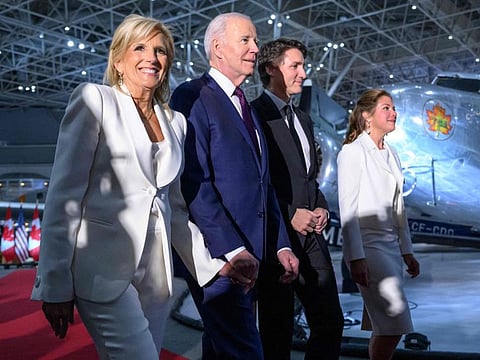Biden, Trudeau say ‘inseparable’ nations won’t fail Ukraine
US, Canada and their allies will defend every inch of Nato territory, Biden says

OTTAWA: President Joe Biden and Prime Minister Justin Trudeau on Friday celebrated the close, “inseparable” U.S.-Canada relationship and vowed that the two nations remain committed to defending Ukraine as it tries to repel Russian attacks that have no end in sight.
Biden’s whirlwind trip to Ottawa, the first one-on-one visit by a US president since 2009, was a show of solidarity.
Biden and Trudeau met just days after Russian President Vladimir Putin and Chinese President Xi Jinping held talks for the first time since the start of the war. The Chinese and Russian leader agreed to deepen economic bonds between their two countries. But Biden argued that Western resolve remains stronger and warned Russia that the US, Canada and their allies would defend “every inch of Nato territory.”
The president also bristled at the notion that Russia has managed to expand a partnership with Beijing that is allowing Moscow to sustain its economy and war effort despite the US lining up an international coalition to economically isolate Russia with a barrage of sanctions. China, however, thus far has refrained from providing Russia weapons since the start of the war, according to the White House.
“We have significantly expanded our alliances,” Biden said with Trudeau by his side during a joint news conference. “Tell me how in fact you see a circumstance where China has made a significant commitment to Russia? What commitment can they make?”
At an earlier appearance with Biden before the Canadian Parliament, Trudeau said his country — which has provided Kyiv with artillery, ammunition, armour and tanks — remained committed to Ukraine’s cause.
“As you well know, Mr. President, Canada will continue to stand strong with Ukraine, with whatever it takes,” Trudeau said.
The whirlwind visit by Biden — his first visit to Canada as president — was meant to showcase US-Canada ties, and both leaders offered full praise of each other.
Biden, addressing Canada’s Parliament, even said the US was “lucky” to have Canada as its neighbour as both countries grapple with the rapidly changing global economy, climate change, war in Europe and more.
“Today our destinies are intertwined and they are inseparable,” Biden said. “Not because of inevitability of geography, but because it’s a choice, the choice we made again and again.”
“Two people, two countries, in my view sharing one heart.”
On one often-difficult subject, immigration, Biden and Trudeau used the visit to announce an agreement aiming to stem the flow of asylum seekers at unofficial border crossings from the US to Canada.
The accord eliminates a loophole under existing rules and will allow both countries to turn away asylum seekers at their borders. At the same time, Canada announced that 15,000 migrants from the Western Hemisphere will be given official slots to apply to enter the country.
The leaders also sat down with top aides for a private conversation. Besides Ukraine and defence spending, the wide-ranging talks touched on shared concerns about political instability in Haiti.
Regarding Haiti, Canada is being nudged by the US and other allies to lead an international mission there to deal with the ongoing humanitarian and security crisis. Canada on Friday announced $100 million ($72.7 million) in new aid for support and equipment for the Haitian National Police.
Biden said the idea of deploying an international force was “not in play at the moment” but had not been taken off the table. Trudeau said the international community can have the most impact in the long term by being “there to support the capacity of the police in Haiti.”
Haitian Prime Minister Ariel Henry and the country’s Council of Ministers sent an urgent appeal last October calling for “the immediate deployment of a specialized armed force, in sufficient quantity” to stop the crisis caused partly by the “criminal actions of armed gangs.” But more than five months later, no countries have stepped forward. Canada’s top military official has suggested the country doesn’t have the capacity.


